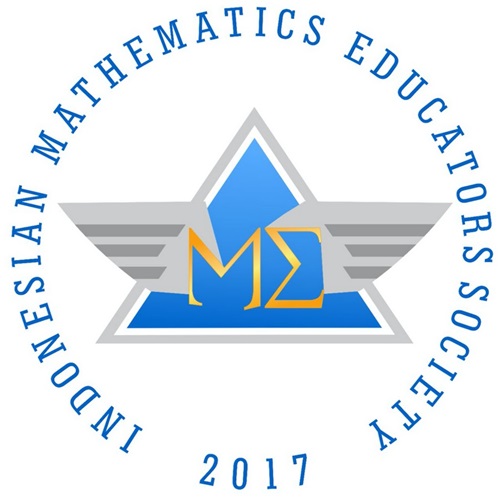Students’ Mathematical Reflective Thinking Ability in Solving System of Linear Equations in Two Variables Problems
DOI:
https://doi.org/10.22437/edumatica.v14i01.31976Keywords:
mathematics learning, reflective thinking ability, system of the linear equation of two variables (SPLDV)Abstract
Mathematical reflective thinking ability is one of the higher-level abilities that can support other mathematical thinking skills. Therefore, ensuring students have good mathematical reflective thinking skills is essential. This study aimed to analyze students' mathematical reflective thinking skills (KBRMS) on the material of a two-variable linear equation system (SPLDV). This research approach is qualitative with a phenomenological type. Data collection techniques were carried out through reflective thinking skills tests and interviews. The study subjects were grade VIII junior high school students who had studied SPLDV material using purposive sampling techniques. Data analysis techniques in this study are data reduction, data display, conclusions, and verification. This mathematical reflective thinking ability analysis is based on indicators of mathematical reflective thinking ability, namely reacting, elaborating, and contemplating. The results of this study show that students can master reacting and elaborating indicators when faced with problems they usually encounter. In contrast, for contemplating indicators, students still experience difficulties when faced with problems different from those traditionally exemplified, such as difficulties in understanding problems and determining the concept of the material used. Based on this, it is shown that students' mathematical reflective thinking skills have not been fulfilled optimally.
Downloads
References
Basuki, K. H., & Farhan, M. (2023). Kontribusi Berpikir Fleksibilitas Terhadap Kemampuan Berpikir Kreatif Matematis. Universitas Indraprasta PGRI Jakarta, 9(1), 135–142. Retrieved from https://proceeding.unindra.ac.id/index.php/DPNPMunindra/article/view/6529
Connelly, L. M. (2010). What is Phenomenology? Medsurg Nursing : Official Journal of the Academy of Medical-Surgical Nurses, Vol. 19. https://doi.org/10.1111/j.1747-9991.2007.00113.x
Deringöl, Y. (2019). The Relationship Between Reflective Thinking Skills and Academic Achievement in Mathematics in Fourth-Grade Primary School Students. International Online Journal of Education and Teaching (IOJET), 6(3), 613–622. Retrieved from https://eric.ed.gov/?id=EJ1246598
Dewey, J. (1933). How We Think: A Restatement of the Relation Between Reflective Thinking to the Educatative Process. In D.C. Heath and Company.
Dinata, F. T., Rusyid, H. K., Fatimah, S., & Herman, T. (2023). Analisis Kemampuan Koneksi Matematis Siswa pada Pembelajaran Luring Pasca Pandemi. Jurnal Pembelajaran Matematika Inovatif, 6(4), 1301–1312. https://doi.org/https://doi.org/10.22460/jpmi.v6i4.17648
Erdogan, F. (2020). The Relationship Between Prospective Middle School Mathematics Research, &(1), 220-241. https://doi.org/10.17275/per.20.13.7.1
Febrianti, F. (2019). Efektivitas Penggunaan Media Grafis Dalam Meningkatkan Motivasi Belajar Siswa. Prosiding Seminar Nasional Pendidikan FKIP, 2(1). Retrieved from https://jurnal.untirta.ac.id/index.php/psnp/article/view/5737
Kamalia, M., & Nuriadin, I. (2021). Analysis of the Mathematical Reflective Thinking Ability of MTs Students in Terms of Self-Regulated Learning During the COVID-19 Pandemic. Desimal: Jurnal Matematika, 4(2), 165–176. https://doi.org/http://dx.doi.org/10.24042/djm.v4i2.9375
Karaoglan-Yilmaz, F. G., Ustun, A. B., Zhang, K., & Yilmaz, R. (2023). Metacognitive Awareness, Reflective Thinking, Problem Solving, and Community of Inquiry as Predictors of Academic Self-Efficacy in Blended Learning: A Correlational Study. Turkish Online Journal of Distance Education, 24(1), 20–36. https://doi.org/10.17718/tojde.989874
Kariadinata, R., & Abdurahman, M. (2015). Dasar-Dasar Statistik Pendidikan. In Buku Dasar-Dasar Statistik Pendidikan. Bandung: Pustaka Setia.
Kholid, M. N., Sa’dijah, C., Hidayanto, E., & Permadi, H. (2020). How are Students’ Reflective Thinking for Problem Solving? Journal for the Education of Gifted Young Scientists, 8(3), 1135–1146. https://doi.org/10.17478/JEGYS.688210
Kholid, M. N., Telasih, S., Pradana, L. N., & Maharani, S. (2021). Reflective Thinking of Mathematics Prospective Teachers’ for Problem Solving. Journal of Physics: Conference Series, 1783(1). https://doi.org/10.1088/1742-6596/1783/1/012102
Kilpatrick, J. (2010). Helping Children Learn Mathematics. In Academic Emergency Medicine (Vol. 7). Washington DC: The National Academies Press. Retrieved from https://nap.nationalacademies.org/catalog/10434/helping-children-learn-mathematics
Mentari, N., Nindiasari, H., & Pamungkas, A. S. (2018). Analisis Kemampuan Berpikir Reflektif Siswa SMP Berdasarkan Gaya Belajar. NUMERICAL: Jurnal Matematika Dan Pendidikan Matematika, 2(1), 31–42. https://doi.org/10.25217/numerical.v2i1.209
Mudakir, N. F., Suratno, J., & Angkotasan, N. (2020). Kemampuan Berpikir Reflektif Matematis Siswa dalam Menyelesaikan Soal Program Linear. Jurnal Pendidikan MIPA, 5(1), 21–26. https://doi.org/https://doi.org/10.33387/saintifik.v5i1.3635
Muntazhimah, M., Turmudi, T., & Prabawanto, S. (2021). The Relation Between Prior Knowledge and Students’ Mathematics Reflective Thinking Ability. Journal of Physics: Conference Series, 1731(1). https://doi.org/10.1088/1742-6596/1731/1/012043
National Council of Teachers of Mathematics. (2020). Excecutive Summary Principles and Standards for School Mathematics. In The Arithmetic Teacher (Vol. 29). Retrieved from https://www.nctm.org/uploadedFiles/Standards_and_Positions/PSSM_ExecutiveSummary.pdf
Nuriadin, I., Kusumah, Y. S., Sabandar, J., & Dahlan, J. A. (2015). Enhancing of Students’ Mathematical Reflective Thinking Ability Through Knowledge Sharing Learning Strategy in Senior High School. International Journal of Education and Research, 3(9), 255–268. Retrieved from https://www.ijern.com/journal/2015/September-2015/21.pdf
Pauji, I., Febrianty, E. D., & Herman, T. (2023). Analysis of Context Utilization in Mathematics Learning Based on Teacher Competency. Jurnal Analisa, 9(1), 37–47. https://doi.org/10.15575/ja.v9i1.25644
Presseisen, & Barbara, Z. (1984). Thinking Skills: Meanings, Models, and Materials. National Institute of Education. Retrieved from https://eric.ed.gov/?id=ED257858
Ramadhani, N. F., & Aini, I. N. (2019). Kemampuan Berpikir Reflektif Matematis Siswa dalam Menyelesaikan Masalah yang Berkaitan dengan Bangun Ruang Sisi Datar. Prosiding Sesiomadika, 2(1). Retrieved from https://journal.unsika.ac.id/index.php/sesiomadika/article/view/2835
Sabandar, J. (2009). Berpikir Reflektif dalam Pembelajaran Matematika. UPI: Himpunan Matematika Indonesia, 1–17.
Salido, A., Suryadi, D., Dasari, D., & Muhafidin, I. (2020). Mathematical Reflective Thinking Strategy in Problem-Solving Viewed by Cognitive Style. Journal of Physics: Conference Series, 1469(1). https://doi.org/10.1088/1742-6596/1469/1/012150
Sihaloho, R., & Zulkarnaen, R. (2019). Studi Kasus Kemampuan Berpikir Reflektif Matematis Siswa SMA. Prosiding Seminar Nasional Matematika Dan Pendidikan Matematika, 2(1c), 736–741. Retrieved from https://journal.unsika.ac.id/index.php/sesiomadika/article/view/2726
Sümen, Ö. Ö. (2023). Reflective Thinking in The Problem-Solving Process: A Model Proposal. Sakarya University Journal of Education, 13(1), 6–23. Retrieved from https://dergipark.org.tr/en/pub/suje/issue/76975/970213
Syadid, RA. A. C. I., & Sutiarso, S. (2022). Hubungan Kemampuan Berpikir Reflektif Matematis dengan Kemampuan Pemecahan Masalah Matematis Peserta Didik. Edu Sains: Jurnal Pendidikan Sains & Matematika, 10(1), 327. https://doi.org/10.23971/eds.v10i1.2823
Syamsuddin, A. (2020). Describing Taxonomy of Reflective Thinking for Field Dependent-Prospective Mathematics Teacher in Solving Mathematics Problem. International Journal of Scientific and Technology Research, 9(3). Retrieved from www.ijstr.org
Umbara, F. D. A. D., & Herman, T. (2023). Kemampuan Berpikir Reflektif Matematis Siswa dalam Menyelesaikan Masalah Matematis Terbuka Ditinjau dari Gaya Belajar. AKSIOMA: Jurnal Program Studi Pendidikan Matematika, 12(1), 1273–1285. https://doi.org/10.24127/ajpm.v12i1.6807
Downloads
Published
How to Cite
Issue
Section
License
Copyright (c) 2024 Eritha Dewi Febrianty, Tatang Herman, Suhendra Suhendra, Syifa Mardliyah, Ikbal Pauji

This work is licensed under a Creative Commons Attribution-NonCommercial-ShareAlike 4.0 International License.







